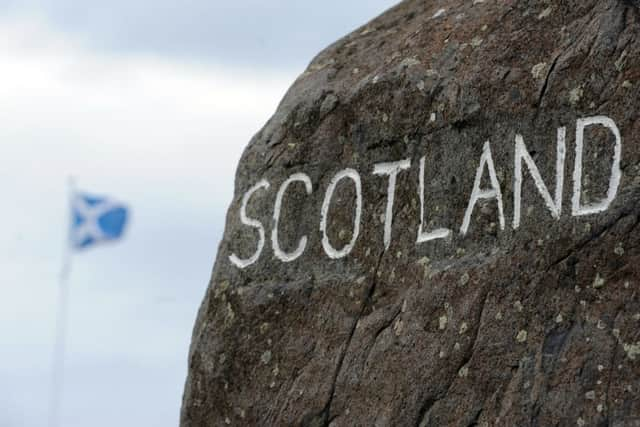Yes backers question survey on Scotland’s economy


Weaker tax revenues, higher borrowing costs, significant transition costs and prolonged uncertainty over Scotland’s place in the European Union (EU) were among the issues raised by 46 experts surveyed by the Centre for Macroeconomics (CFM).
Only one economist thinks Scotland would be better-off out of the experts surveyed from Deutsche Bank, Birkbeck, University College London, London Business School, the London School of Economics, Royal Holloway and the universities of York, Oxford, Kent, Warwick and Heriot-Watt in Edinburgh.
Advertisement
Hide AdAdvertisement
Hide AdExperts were divided over the economic sense of the UK refusing a currency union with an independent Scotland, with three-fifths casting doubt over how robust such an arrangement would be but others regarding it as a viable option that is being dismissed as a campaign tactic.
Three-quarters of the respondents said that they either disagree or strongly disagree with the notion that Scotland would be better-off in economic terms as an independent country, out of the 28 respondents who replied to the question.
Some 95 per cent of respondents disagreed that Scotland would be better off, excluding the six respondents who say they neither agree nor disagree.
George Buckley, of Deutsche Bank, said an independent Scotland would be exposed to weaker tax revenues from depleting oil resources and a worse demographic profile than in the rest of the UK.
John Driffill, from Birkbeck, said an independent Scotland could set its own policies to suit preferences in Scotland, but may lose out because some things that are done better jointly by Scotland and the rest of the UK will become more difficult to co-ordinate.
Michael McMahon, of Warwick University, said that there would be “significant transition costs”.
UK stance ‘purely motivated to influence referendum’
Michael Wickens, of York University, and Martin Ellison, from Oxford University, said Scotland might pay higher borrowing costs than the UK while Mr Ellison said the recent euro crisis “shows how challenging a monetary union is without a fiscal, political and banking union”.
But Andrew Mountford, of Royal Holloway, said a currency union “should be possible” while Mr Driffill said that the UK’s stance “is purely motivated to influence the referendum”.
Advertisement
Hide AdAdvertisement
Hide AdCFM is a research centre funded by the Economic and Social Research Council and includes the University of Cambridge, the London School of Economics (LSE), University College London (UCL) and the National Institute of Economic and Social Research (NIESR).
This is its first survey of independent professional economists specifically to address economic issues in the Scottish independence debate.
Professor David Simpson, former chief economist at Standard Life, said: “It appears that almost 40 per cent of those who were asked did not reply to the first question, namely would Scotland be better-off as an independent country.
“It may be that they did not feel themselves well-qualified to answer it.
“What is unambiguously obvious from the survey results is that less than half of those economists who were surveyed disagreed with the proposition that Scotland would be better-off as an independent country.
‘Less than 40 per cent agree with UK Government position’
“Many economists will be inclined to give the greatest weight to the response of an undisputed expert, the Nobel prizewinner Sir Christopher Pissarides, who correctly observes that the UK Government’s stance on the proposed monetary union is purely motivated by a desire to influence the outcome of the forthcoming referendum.
“The unweighted results show that less than 40 per cent of those surveyed agree with the UK Government’s position.”
Gordon MacIntyre-Kemp, chief executive of pro-independence group Business for Scotland, said: “I spent many years working in economic development and I’ve found that the best economic intelligence comes from people who are making the economy work.
Advertisement
Hide AdAdvertisement
Hide Ad“Many business people, those creating jobs, generating profits and paying tax, say Scotland will be better-off as an independent country.
“More than 2,000 business people have now joined Business for Scotland; they believe independence is the business opportunity of a lifetime and we aim to help them seize it with both hands.”
Academics for Yes founder Dr Stephen Watson said: “It is difficult to respond to an opinion poll when the opinions are not supported by evidence and argument, and it is unclear if those offering opinions have the appropriate level of knowledge and understanding to make an assessment.
“The independent SG’s Fiscal Commission that is headed up two Nobel Laureates have presented compelling evidence on the strength of an independent Scotland’s economy.
“Their findings were echoed in the recent independent analysis in the Financial Times, which noted that the fiscal position of an independent Scotland would be better than that within the UK.
“Indeed, the international Standard & Poor review of February 2014 also noted that an independent Scotland’s GP per capita would jump markedly upwards after independence, exceeding even that of Germany. ‘Business for Scotland’ and ‘The Common Weal’ have also separately concluded that independence will lead to greater prosperity for Scotland.
“Last, even HMRC figures concede that Scotland is a net exporter with a positive balance of trade while the UK is a net importer with a negative balance of trade, all of which bodes very well for an independent Scotland’s future.
“In conclusion, the people of Scotland can confidently vote Yes on September 18 safe in the knowledge that a more prosperous Scotland lies ahead.”